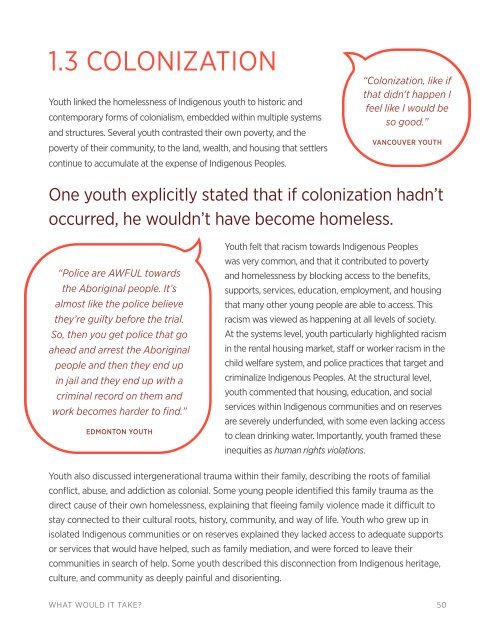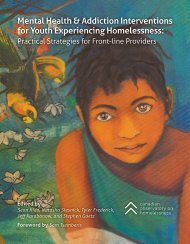COH-AWH-What_Would_it_Take
You also want an ePaper? Increase the reach of your titles
YUMPU automatically turns print PDFs into web optimized ePapers that Google loves.
1.3 COLONIZATION<br />
Youth linked the homelessness of Indigenous youth to historic and<br />
contemporary forms of colonialism, embedded w<strong>it</strong>hin multiple systems<br />
and structures. Several youth contrasted their own poverty, and the<br />
poverty of their commun<strong>it</strong>y, to the land, wealth, and housing that settlers<br />
continue to accumulate at the expense of Indigenous Peoples.<br />
“Colonization, like if<br />
that didn’t happen I<br />
feel like I would be<br />
so good.”<br />
VANCOUVER YOUTH<br />
One youth explic<strong>it</strong>ly stated that if colonization hadn’t<br />
occurred, he wouldn’t have become homeless.<br />
“Police are AWFUL towards<br />
the Aboriginal people. It’s<br />
almost like the police believe<br />
they’re guilty before the trial.<br />
So, then you get police that go<br />
ahead and arrest the Aboriginal<br />
people and then they end up<br />
in jail and they end up w<strong>it</strong>h a<br />
criminal record on them and<br />
work becomes harder to find.”<br />
EDMONTON YOUTH<br />
Youth felt that racism towards Indigenous Peoples<br />
was very common, and that <strong>it</strong> contributed to poverty<br />
and homelessness by blocking access to the benef<strong>it</strong>s,<br />
supports, services, education, employment, and housing<br />
that many other young people are able to access. This<br />
racism was viewed as happening at all levels of society.<br />
At the systems level, youth particularly highlighted racism<br />
in the rental housing market, staff or worker racism in the<br />
child welfare system, and police practices that target and<br />
criminalize Indigenous Peoples. At the structural level,<br />
youth commented that housing, education, and social<br />
services w<strong>it</strong>hin Indigenous commun<strong>it</strong>ies and on reserves<br />
are severely underfunded, w<strong>it</strong>h some even lacking access<br />
to clean drinking water. Importantly, youth framed these<br />
inequ<strong>it</strong>ies as human rights violations.<br />
Youth also discussed intergenerational trauma w<strong>it</strong>hin their family, describing the roots of familial<br />
conflict, abuse, and addiction as colonial. Some young people identified this family trauma as the<br />
direct cause of their own homelessness, explaining that fleeing family violence made <strong>it</strong> difficult to<br />
stay connected to their cultural roots, history, commun<strong>it</strong>y, and way of life. Youth who grew up in<br />
isolated Indigenous commun<strong>it</strong>ies or on reserves explained they lacked access to adequate supports<br />
or services that would have helped, such as family mediation, and were forced to leave their<br />
commun<strong>it</strong>ies in search of help. Some youth described this disconnection from Indigenous her<strong>it</strong>age,<br />
culture, and commun<strong>it</strong>y as deeply painful and disorienting.<br />
WHAT WOULD IT TAKE? 50
















